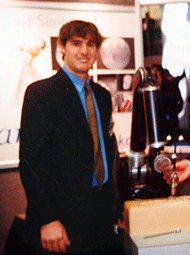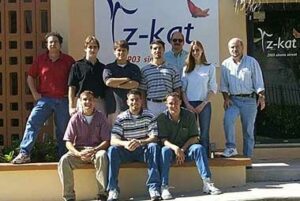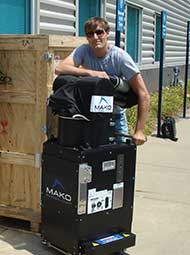Building a Successful Career in Medical Robotics From Co-op

Co-ops at Barrett Technology and Z-Kat introduced David Dybala, E’01, electrical and computer engineering, to his postgraduate career and allowed him to have a hand in developing a groundbreaking robotic arm for orthopedic surgeries.
As an extension of its Mako robotics line, medical technology manufacturer Stryker will release applications for its robotic arm for shoulder and spinal surgeries at the end of 2024. It’s based on a prototype that David Dybala, E’01, electrical and computer engineering, presented at an orthopedic conference in San Francisco years ago.
“Internally, it’s funny it took this long to use this technology for this purpose,” says Dybala. “23 years ago, the prototype was rudimentary, but it was still there and was the original procedure envisioned by the founders of Z-Kat at the time.”

Dybala presenting Z-Kat’s prototype robotic arm for spinal surgeries at the 2001 AAOS Conference
The conference was one of several unique and exciting opportunities afforded to Dybala through his co-op at Z-Kat, later MAKO Surgical. After his co-op ended, Z-Kat asked Dybala if he would be interested in attending the conference to help present the robotic arm. “That was an exciting opportunity,” he says, “Before graduating, I got to attend the largest orthopedics conference in the world and gain insight into the industry.”
Now a full-fledged employee at Stryker, Dybala’s career has gone full circle. He continues to work with the technologies he had a hand in developing during college, albeit in a more senior position. His longevity with the company has earned him a positive reputation with the external network of surgeons he sells to, all impressed with his lengthy history on his team.
He credits his co-op experience for introducing him to his line of work, an opportunity he grew into his current career. “It’s neat that 25 years later, where I am today is still linked to two different co-ops,” Dybala says. “I haven’t had to do a real interview in a company where I didn’t have an already-established connection since 1999.”
Dybala was first introduced to engineering through a three-year robotics program run by the vocational-technical center at his high school. Although initially hoping to pursue a career in the sports industry, he was drawn to the program because of the industry’s upward trajectory.
“I realized that technology was a good path for a long-term career,” says Dybala. “I felt like it was on the verge of exploding.”
When applying to colleges, Dybala gained an initial interest in Northeastern through a friend. He was enticed by Northeastern’s Boston location, growing up going to Fenway Park a few times a year as a family, but the co-op program sealed the deal. “The co-op program was something that really inspired me to go to Northeastern,” he says.
For his first co-op, Dybala took a position at semiconductor vendor LTX Corporation, where he wrote code to debug the semiconductors. The role provided him with a mix of hardware and software experience, but over the course of the co-op, he realized the end product he was working with did not hold his interest.
“It wasn’t too extensive,” says Dybala. “I remember not feeling fulfilled with what I was working on, and wanting to be involved with something with more moving parts.”
Before his term at LTX finished, Dybala knew he wanted to return to robotics for his next co-op. This led him to Barrett Technology, a small Boston-based robotics firm that manufactures robotic arms and hands. Barrett granted Dybala the hands-on experience he sought, allowing him to work intimately with their emerging technologies on a small team by assembling the arm and writing code to test the arm’s mobility, as well as debugging circuit boards for the robotic hand.
Dybala felt connected to his work at Barrett because he was working on groundbreaking technology with a future ahead of it. “It was exciting because I felt like we were making something that had exciting real-world applications,” he says. Barrett proved to be a milestone experience for Dybala, who grew a career out of this co-op.
Dybala’s third co-op was a self-made position at Z-Kat, a startup company that created medical devices for orthopedic uses. He met Z-Kat founder Rony Abovitz while Z-Kat was negotiating a licensing agreement to utilize Barrett’s robotic arm and develop it for the surgical field. Dybala had stopped by Barrett during a run along the Charles River and spoke with Barrett’s founder, and coincidentally was going to be visiting with Abovitz in Florida the next day. This came at an ideal time for Dybala, who was searching for local roles after a position as a Disney Imagineer did not pan out.

Dybala (lower left) during his co-op at Z-Kat
From meeting the founder while visiting the Barrett office to getting hired at Z-Kat, Dybala says the process happened quickly. “I only had a few days to make a final decision for co-op,” Dybala says. “After they expressed interest in hiring me, I immediately reached out to Abovitz, and they flew me down the next day. When I returned the following day, I met with my co-op advisor and she already had the offer from Z-Kat.”
While at Z-Kat, Dybala continued his work on the robotic arm, this time adjusting the arm and its controllers to make it medical-grade. He enjoyed creating something for practical use, which differed from his co-op at Barrett, where the arm was used solely for research. “They were going to put a product into real-world use,” Dybala says. “That definitely intrigued me.”
Before his co-op ended, Dybala expressed interest in returning to Z-Kat as a full-time employee. Formal conversations around Dybala’s hiring took place around the time of the orthopedic conference in San Fransisco, during the six months between the end of his co-op term and graduation. He began his postgrad career by supporting Z-Kat’s navigation applications after graduation.
Through his work with navigation technology, Dybala gained field experience, traveling to hospitals to support the technology’s implementation. Through his fieldwork, Dybala shadowed various surgeries, which he describes as an eye-opening experience. “Here I was, 23 years old and right out of school, and I’m in the operating room seeing a craniotomy,” he says. “It was wild.”

Dybala in 2007 with the original Mako Robotic Arm
Z-Kat faced financial strain following the September 11 attacks and eventually partnered with the orthopedic company Biomet. As a result of the merger, the robotics projects Z-Kat was developing were underfunded and had to be mostly shelved. Dybala continued to support Biomet’s navigation technology.
The founders of Z-Kat eventually secured new funding and formed MAKO Surgical, which focused solely on developing the robotic arm for orthopedic surgery. When Biomet decided to stop investing in its navigation technology, Dybala transferred back to what was now MAKO to support the implementation of the robotic arm in the field.
In the years since he joined MAKO, Dybala has witnessed exponential growth within the company, spending the first few years traveling to various hospitals around the country launching their robotics programs. As demand for the robotic arm increased, more representatives were hired, transforming Dybala’s department from a single-man operation to a division with hundreds of representatives employed. In 2013, MAKO was acquired by Stryker, ironically a direct competitor of Biomet, in a $1.65 billion deal, furthering the reach of the robotic technology.
Today, Dybala continues to support hip and knee replacements with the robotic arm as a member of Stryker. He takes pride in his continued longevity with the company and the impact he’s had.
“Now we have probably over 800 reps in the field supporting the robotic arm all over the world,” says Dybala. “Many know I was the original.”